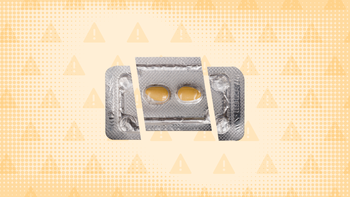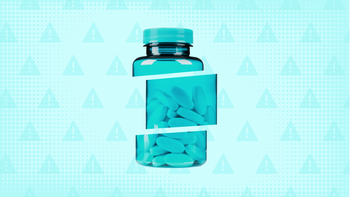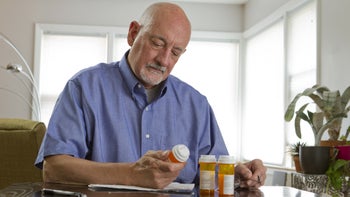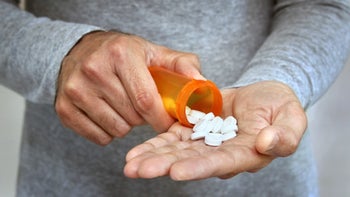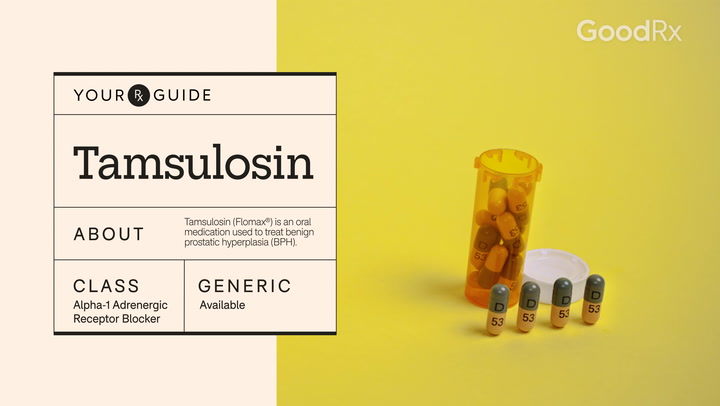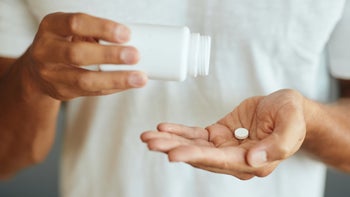
Benadryl, Sudafed, and More: 7 Medications to Avoid if You Have an Enlarged Prostate
Key takeaways:
An enlarged prostate, or benign prostatic hyperplasia (BPH), affects many men as they get older. And for some, BPH can cause urinary symptoms such as difficulty emptying the bladder.
Some medications can worsen urinary symptoms of BPH. These include antihistamines, decongestants like pseudoephedrine (Sudafed), and tricyclic antidepressants (TCAs). Muscle relaxers like cyclobenzaprine (Fexmid, Amrix) and orphenadrine are also possible culprits.
Your healthcare team can help you avoid medications that worsen BPH symptoms. Talk with your pharmacist and prescriber when starting a new medication or supplement to be sure it’s safe for you to take.
Table of contents

Benign prostatic hyperplasia (BPH), or an enlarged prostate, is a common health condition that affects many men as they get older. BPH can lead to uncomfortable urinary symptoms, such as difficulty emptying your bladder completely. There are treatments available to help manage these symptoms. But some common medications may actually make them worse.
Certain over-the-counter (OTC) allergy pills, cold and flu medicines, and sleep aids can worsen BPH symptoms. And some prescription medications can cause problems, too. Below, we cover seven medications to avoid if you have an enlarged prostate, plus potential alternatives.
1. Allergy medications like Benadryl
Diphenhydramine (Benadryl) is a first-generation antihistamine that’s taken for allergies, among other uses. But it has a warning about taking it if you have trouble urinating due to BPH. This is because first-generation antihistamines can cause urinary retention (inability to completely empty your bladder), which can worsen BPH symptoms.
Talk to your pharmacist or prescriber about a different allergy medication that has a lower risk of urinary problems. Steroid nasal sprays, such as fluticasone (Flonase), are one option to consider. Second- and third-generation antihistamines, such as loratadine (Claritin) and fexofenadine (Allegra), don’t have the same warning and may be OK to take.
Along with diphenhydramine, OTC cold and flu medications often contain other first-generation antihistamines, such as chlorpheniramine. This is especially the case for “nighttime” formulations since these antihistamines can make you sleepy.
If you’re treating cold and flu symptoms, be sure to read the product’s label closely before taking it. Your pharmacist can tell you if the product contains any ingredients that you should avoid.
2. Motion sickness pills like Dramamine
Dimenhydrinate (Dramamine) is also an OTC first-generation antihistamine. It’s often used to prevent or relieve motion sickness symptoms. Dimenhydrinate is similar to diphenhydramine. So, the label has the same warning if you have urination problems from BPH. It can cause urinary retention and make it harder to empty your bladder.
If you have BPH, talk to your healthcare team before taking motion sickness pills like dimenhydrinate. Your pharmacist or prescriber may suggest using something else. For example, there are a few medication-free options you can try, such as eating ginger candy or wearing an acupressure bracelet.
3. OTC sleep aids like Unisom
Doxylamine (Unisom) is an OTC first-generation antihistamine that’s used to help you get to sleep. Its label also has a warning about taking it if you have an enlarged prostate due to its risk of urinary retention.
Check with your pharmacist or prescriber about alternatives to doxylamine. They can recommend other options for sleep, such as melatonin. Alternatively, there are prescription sleep medications that may help in certain situations.
Similar to diphenhydramine, doxylamine is also found in combination cold and flu medications. One common example is Nyquil. Talk to your pharmacist about safer alternatives to help manage your symptoms.
4. Decongestants like Sudafed
Pseudoephedrine (Sudafed) is an oral decongestant. Along with narrowing blood vessels in the nose, it can also cause tightening of the bladder neck, urethra, and prostate, making it harder to pee.
Because of this, pseudoephedrine’s label contains a warning about taking it if you have an enlarged prostate. The decongestant nasal sprays oxymetazoline (Afrin) and phenylephrine (Neo-Synephrine) have the same warning. Keep in mind that these decongestants are also found in many combination cold and allergy medications.
There are alternative decongestants that may be safer than pseudoephedrine, oxymetazoline, and phenylephrine if you have BPH. Steroid nasal sprays, such as fluticasone, are less likely to cause problems and may be a better choice. You can also try home remedies, such as a nasal saline rinse.
Good to know: Oral phenylephrine (Sudafed PE) has the same warning as pseudoephedrine. But, it isn’t considered to be effective for congestion.
5. Tricyclic antidepressants
Tricyclic antidepressants (TCAs) are used to treat health conditions such as depression. Examples include amitriptyline and nortriptyline (Pamelor). TCAs prevent bladder muscles from tightening. This can cause urinary retention and worsen BPH symptoms.
People who have certain urinary conditions, including BPH, should avoid TCAs if possible. Your prescriber can suggest a different type of antidepressant without urinary side effects.
6. Muscle relaxers like cyclobenzaprine
Muscle relaxers are used to treat muscle pain and spasms, such as back and neck pain. Some muscle relaxers may be more likely to cause urinary retention and worsen BPH symptoms. Examples of these include cyclobenzaprine (Fexmid, Amrix) and orphenadrine.
If you need help managing muscle pain, soreness, or stiffness, your prescriber can discuss safer treatment options.
7. Diuretics
Diuretics, also known as water pills, help you pee out extra fluid from your body. They’re often used to treat health conditions such as edema (fluid buildup), heart failure, and high blood pressure. But since diuretics make you pee more, they may worsen BPH symptoms by putting more strain on an already blocked urine flow.
Most diuretics require a prescription. But some are available OTC, such as the Diurex line of products. It’s best to avoid OTC diuretics. And your healthcare team can determine if prescription diuretics are necessary, or if alternative treatments are a better option for you.
The bottom line
Antihistamines, antidepressants, and decongestants can worsen urinary symptoms of benign prostatic hyperplasia (BPH), or an enlarged prostate. In general, it’s best to avoid these medications unless your prescriber tells you otherwise.
Make sure to read the label on any over-the-counter (OTC) medication before taking it. Some of them have warnings for people with BPH. In this case, talk to your care team first. If needed, they can suggest safer alternatives.
Why trust our experts?



References
A-S Medication Solutions. (2023). Fexofenadine HCL - fexofenadine hcl tablet [package insert].
BF, Ascher and Co, Inc. (2023). Neo-synephrine regular - phenylephrine hydrochloride spray [package insert]. DailyMed.
Bryant Ranch Prepack. (2024). Allergy relief non drowsy - loratadine tablet [package insert].
DailyMed. (n.d.). Search results for diurex.
Institute for Quality and Efficiency in Health Care. (2022). Benign enlarged prostate: Learn More – Prostate problems: What can I do myself? InformedHealth.org.
Johnson and Johnson Consumer Inc. (2024). Benadryl - diphenhydramine hydrochloride tablet, film coated [package insert]. DailyMed.
Johnson and Johnson Consumer Inc. (2024). Sudafed PE sinus congestion- diphenhydramine hydrochloride and phenylephrine hydrochloride kit [package insert]. DailyMed.
Johnson and Johnson Consumer Inc. (2024). Sudafed sinus congestion - pseudoephedrine hydrochloride tablet, film coated [package insert]. DailyMed.
Khan, I., et al. (2023). Cyclobenzaprine. StatPearls.
Medtech Products Inc. (2023). Dramamine original formula - dimenhydrinate tablet [package insert]. DailyMed.
Quality Choice. (2023). Unisom sleepmelts nighttime sleep-aid - diphenhydramine hydrochloride tablet, chewable [package insert]. DailyMed.
Selius, B. A., et al. (2008). Urinary retention in adults: Diagnosis and initial management. American Family Physician.
Shao, I. H., et al. (2016). Voiding dysfunction in patients with nasal congestion treated with pseudoephedrine: A prospective study. Drug Design, Development and Therapy.
Shenot, P. J. (2023). Urinary retention. Merck Manual.







